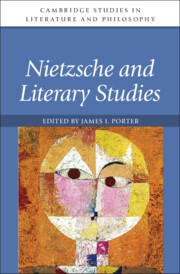Book contents
- Nietzsche and Literary Studies
- Cambridge Studies in Literature and Philosophy
- Nietzsche and Literary Studies
- Copyright page
- Contents
- Contributors
- Abbreviations
- Introduction
- 1 Heraclitus’ Clarity
- 2 Ariadne, or the Mediation of the Image
- 3 Nietzsche’s Centaurs
- 4 Nietzsche on the Task of the Poets in His Middle Writings
- 5 Some Images in Nietzsche’s Zarathustra
- 6 Nietzsche Ludens
- 7 Nietzsche and French Literature from the End of the Nineteenth Century to 1914
- 8 Ecce Mann
- 9 Plant Imaginaries and Human Existence in Nietzsche and Sartre
- 10 The Resources of the Figure
- 11 Nietzsche and Jewish Survival between Sarah Kofman and Jacques Derrida
- Editions and Translations of Nietzsche’s Works
- References
- Index
7 - Nietzsche and French Literature from the End of the Nineteenth Century to 1914
Published online by Cambridge University Press: 03 May 2024
- Nietzsche and Literary Studies
- Cambridge Studies in Literature and Philosophy
- Nietzsche and Literary Studies
- Copyright page
- Contents
- Contributors
- Abbreviations
- Introduction
- 1 Heraclitus’ Clarity
- 2 Ariadne, or the Mediation of the Image
- 3 Nietzsche’s Centaurs
- 4 Nietzsche on the Task of the Poets in His Middle Writings
- 5 Some Images in Nietzsche’s Zarathustra
- 6 Nietzsche Ludens
- 7 Nietzsche and French Literature from the End of the Nineteenth Century to 1914
- 8 Ecce Mann
- 9 Plant Imaginaries and Human Existence in Nietzsche and Sartre
- 10 The Resources of the Figure
- 11 Nietzsche and Jewish Survival between Sarah Kofman and Jacques Derrida
- Editions and Translations of Nietzsche’s Works
- References
- Index
Summary
Nietzsche’s writings belong to a hybrid genre that pertains as much to literature as to philosophy. The first wave of French Nietzscheanism, dating from the 1890s to the First World War, occurred primarily in the field of literature. By contrast, in the eyes the philosophers who held sway in the university system, Nietzsche was considered too much of a poet and brilliant essayist to be a serious philosopher. A further explanation for the seductive power Nietzsche exercised on French writers is that he himself had a predilection for writers and thinkers in the tradition of Montaigne and Pascal over the French moralists, including his most immediate contemporary in France, Hippolyte Taine. Nevertheless, the reception of Nietzsche among French writers was selective and critical. André Gide saw in Nietzsche a fellow immoralist, but he kept a distance from Nietzsche the philosopher. Paul Valéry was happy to acknowledge the pleasure that reading Nietzsche’s prose gave him, but he was a harsh judge of what he deemed Nietzsche’s disregard for conceptual precision. Marcel Proust treated Nietzscheanism as a social phenomenon in À la recherche du temps perdu, sprinkling remarks about the author of The Case of Wagner across his characters while remaining himself a committed Wagnerian.
- Type
- Chapter
- Information
- Nietzsche and Literary Studies , pp. 166 - 185Publisher: Cambridge University PressPrint publication year: 2024

